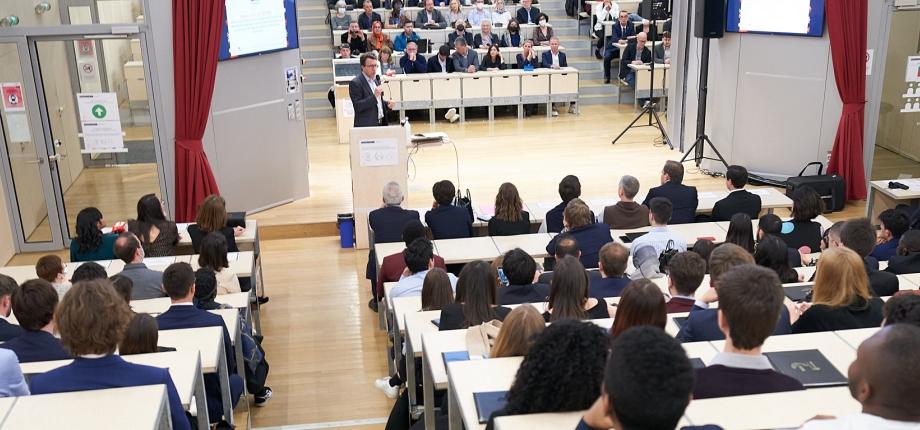Collaborate with ENSAE Paris

To intervene in training
Proposing a project or thesis
Theses allow students to study a subject in depth in a small group under the responsibility of professionals from the world of business, economic administration or research. They are of great importance in the training provided at ENSAE, and allow students to: appropriate theoretical knowledge by mobilizing it within the framework of a concrete project; acquire mastery and critical distance with respect to models and methods; learn to work in a team; and develop their creativity and capacity for initiative. These theses offer students and professionals the opportunity for mutually beneficial collaboration. The professional finds a chance to renew his or her view of his or her field and to advance some of his or her projects thanks to the students' investment.
Proposing an applied statistics project
Approximately 70 projects per year, from October to May: the objective of this course is to allow 2nd year engineering students, guided by a supervisor, to apply their scientific skills (econometrics, statistics, time series, data science) to respond to a problem, using data and statistical software of the supervisor's choice (SAS, R, Stata, Python, etc.) and writing a summary report presenting their work and conclusions.
To propose a topic and supervise a group, contact us at stat_app@ensae.fr.
Proposing a descriptive economics project
This project is designed for first-year students in the science field and aims to familiarize them with contemporary economics topics. The students work in small groups of 3 or 4 students, under the guidance of an outside consultant. Based on the reading of simple bibliographical references (press, reviews, reports, etc.) provided by the supervisor and enriched by the students, the latter must construct a structured argument on a non-technical economic subject. At the end of the dissertation, students must be able to understand and analyze the stakes of an economic issue as well as produce a written report and give an oral defense summarizing their work.
To propose a topic and supervise a group, contact us at macroeconomie@ensae.fr.
Sponsor an innovation challenge: the Business Data Challenge
The Business Data Challenge is a close collaboration between a company, the students of the "Data Science & Business Decision" specialization and the specialized Master's program, and the ENSAE Paris teacher-researchers who supervise them, with the support of Datastorm, the consulting and research development subsidiary of GENES.
A company, in collaboration with the school's teacher-researchers, proposes an economic or financial topic and provides the data on which several groups of students work from November to May. The general approach of the Challenge is R&D oriented: the students explore a new business issue, not deliver an immediately industrializable solution. Most of the work done by the students in the framework of this project concerns the analysis of the business problems proposed by the company, the modeling and the implementation of data science techniques (econometrics and machine learning) on the real data provided by the sponsoring company. Particular care is given to the choice of methods so that they meet the problematic formulated by the company.
The StatUp hackathon
This hackathon mobilizes students from ENSAE Paris around challenges in machine learning and deep learning in the service of general interest actions carried out by charitable associations. This event is organized by the student association StatUp.
Chairing a jury
Presiding over the end-of-study internship defense: all third-year students complete their schooling with the defense of their end-of-study internship. The jury for these defenses is composed of a teacher and an expert in the field(s) of the internship. These external experts are invited to give their opinion on the content of the internship and the report, informed by their in-depth knowledge of the issues and methods in their field. It is also a way for them to exchange with ENSAE students and teacher-researchers, and to monitor the most recent methods used by our students. Contact us at stage@ensae.fr
To propose courses
Exchange with our teacher-researchers in the context of seminars and professional conferences and thus contribute to the orientation of our programs and in particular of our specialization tracks. Contact us at info@ensae.fr
Presenting at a seminar
Seminars and conferences with professional speakers allow students in the process of specializing (3rd year of the engineering cycle, specialized Masters, M2) to clarify the construction of their professional project, by illustrating fields with themes and speakers.
- Seminar in quantitative marketing: intended for third-year engineering students in the Data Science & Business Decision track, as well as for students in the Specialized Master's track: a professional presents a practical case study in which the quantitative methods taught at ENSAE are used to address a business issue. It takes place every year in February-March. If you would like to propose a presentation, please contact the coordinator of the microeconomics courses: microeconomie@ensae.fr.
- Finance seminar: intended for third-year students in the Finance, Risks and Data engineering program, as well as for students in the specialized master's program. If you wish to propose a presentation, please contact Peter Tankov
- Economic Policy Seminar: intended for third-year students in the Economic Policies and Dynamics track of the engineering program, this seminar seeks to link the macroeconomics training students have received with its application to economic policy debates and professional activity. If you would like to propose an intervention, please contact the macroeconomics coordinator: macroeconomie@ensae.fr.









